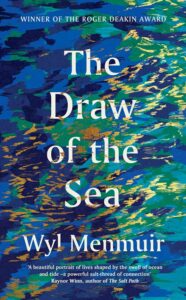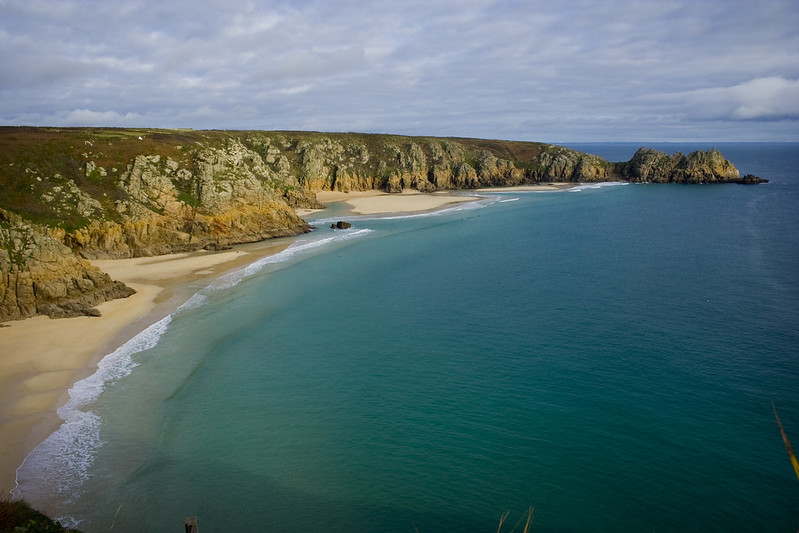
Ocean Decade – Why we love the sea, and why the urgency to protect it (Cornish Coast and the Isles of Scilly, England, 2019-2021 present-day): What does the sea mean to so many? asks British author Wyl Menmuir who lives a mile from the Atlantic Ocean along the Southwest tip of England in Cornwall, the “longest shoreline of any county in the British Isles,” 326 miles.
Like The Many in Menmuir’s 2016 longlisted Booker-prize novel set on the Cornish coast, his nonfiction The Draw of the Sea describes many ways the ocean means to so many. In so doing, he shows us why the UN declared 2021 to 2030 the Ocean Decade. Why the multitudes who love the sea, live by it, depend on it, can no longer do so without understanding the urgency of what’s happening to it. “If you ask ten different people what they see when they look at the coastline you will get eleven different answers.”
The “otherness” of “a sacred space” that’s “everything the land is not” explains why there’s no single answer to why the sea captures us profoundly. Perhaps all the reasons can’t be contained in this one book, but it feels as though they are. At least for Britain’s North Coast region of the Atlantic Ocean, with its stunning beaches, towering cliffs, hidden coves, and long history, folklore, culture.

Aesthetically, we’re drawn to this handsomely produced book, with its golden, glittering dust jacket. Watercolor images of the sea at low tides wrap the inside cardboard cover front and back creating a sense of wholeness. Sixty black-and-white photographs taken from the camera Menmuir carries around with him illustrate otherworldly ocean tales he digs up. A striking one is of a walrus tucked into a cranny on an “ambulance boat,” having gone way off course. A “symbol of climate change.” Marine mammologists and marine scientists are examples of the diversity of people Menmuir sought out to gather a broad perspective as to what this unique ocean world means to many.
As a creative writing teacher at Falmouth University located in Cornwall, Menmuir is many things too: literary poet, historian, photojournalist, and a lover of the sea – a Thalassophile.
An eight-page A Glossary of Sea Words found at the back of the book demonstrates a genuineness of wanting to communicate a world unknown to so many of us who’ve not spent time on the Cornish coast. A world deserving of its own vocabulary. British English revolving around the sea feels like a foreign language!
For instance, beachcomber along the shoreline translates into “wrecker” along the “strandline.” Hence insight into the meaning of the title of the opening chapter “Strandline Gleaner.” There’s a long-history of shipwrecks on these rough northern seas, so there’s a Cornish word for “someone who collects from the beach items washed up from the shores – a “wrecker” whose action is “wrecking.” Menmuir has a word for the know-how: “flotsamancy, a prediction of where the most interesting wreck will wash in, based on a combination of hunch, tip-offs and weather tracking.”
Cornwell is likened to “an outstretched arm” that’s “open to the wild weather and putting it in the path of the Atlantic gyres,” so even the author’s house is built from wood salvaged from a shipwreck (hardwood from a Nigerian tree, Iroko.) Today these beaches are a collector’s paradise, but long ago livelihoods depended on it. A “secret business” made into a documentary, The Wrecking Season. The book opens with an epigraph, paying tribute to the playwright Nick Darke who made the film, passing away soon after he spoke these words:
“It’s the beginning of the day, you’re alone, first on the beach. No footprints, there’s a gale blowing, gigantic sea running, and there’s wreck as far as you can see. You’re alive. Your eyes are everywhere, your heart’s thumping, you’ve got such a sense of anticipation – some people jump out of aeroplanes for that kind of thrill. I just walk onto the beach.”
Darke’s prose lyrically sets the tone for Menmuir’s intimate and humane compilation of spirited testaments to the meaning of the sea to the many. Often variations of, “We go down to the sea for a taste of freedom, a taste of the borderless and expansive.”
The sea is so powerful it’s ingrained in our language, Menmuir points out:
“When we grieve, we are adrift or unmoored . . . and when we are struggling – mentally, financially, spiritually – we try to keep our heads above water. We look to dry land, try to remain grounded, and we hope for plain sailing in the days to come.
In the second chapter “Island Fisher,” we meet an endangered lobsterman, Jof Hicks. Menmuir interviewed him on the essentially uninhabited island of St. Agnes, one of the fifty islands that make up the Isles of Scilly off the Cornish coast. An ancient world, Jof used an ancient craft to weave “withy pots” from the barks of willow trees, instead of plastic lobster traps that have taken over the industry. Presented as a time-consuming, ethical approach that could help save the seas from its “greatest threat”: the mind-boggling amount of plastic debris washing up along the shores endangering the fish we eat and the health of the oceans. The effort Menmuir made to seek Jof’s unique and sea-loving story sticks with us when we learn that he wanted to speak with Jof again only to find out he’d passed away. Jof’s words live on: “In the past, we paired science with economics and that has failed . . . So let’s pair science with art and see what happens.”
People collect the plastic debris obsessively, often for nostalgic reasons. Memories of childhood toys like plastic cowboys are treasured. “Fisherman’s kisses,” which are tiny pieces frayed off of fishing nets, are reminders, though, of the extreme need for ocean conservation. One group combing a beach area found 10,000 of these so-called kisses in no time. Consider too this shocking factoid: there’s an “estimated eight million pieces of plastic that enter the sea every day, amounting to almost 270,000 tons”!
In the breathtaking “Depth Plumber” chapter, we’re introduced to a relatively new “sport” of underwater diving in which the diver uses minimal equipment – freediving. Less is more for this supposedly “relaxing,” almost “spiritual” experience. There’s no oxygen tank, only the diver’s ability to hold his/her breath under water as long as humanely/superhumanly possible. The record-holder – 7 minutes! While we think it’s the loss of oxygen that causes us to exhale, or in this case, swim to the top of the water gasping for air, we’re told it’s actually the pain of too much carbon dioxide.
The freedivers Menmuir follows are women. Some call themselves mermaids; they actually perform as mermaids at parties. The author, an avid surfer (surfing is a big part of life here including a group called Surfers Against Sewage) is in awe of the “serenity” of the freedivers. Terrified of what he’s observing, he still tries it. One woman especially catches our attention too: diagnosed with ADHD saying freediving makes her feel calmer, freer, thus giving us a glimpse into what it might feel like when your brain is on sensory overload. Still, given all the sensations and things she must see under the waters, surprising. Apparently less discordant than land life. What does that say about what we’ve done to our landscapes?
Menmuir turns that question into everything the land is not. Plunging deeper into why we can no longer take the seas we love and rely on for granted.
Lorraine